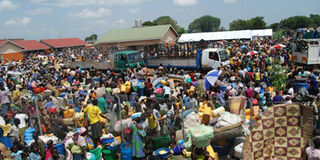UN officials to assess record in Uganda

Concerns. South Sudan refugees at Elegu refugees collection centre in Amuru District in 2016. UN officials are expected to visit refugee camps. PHOTO BY JULIUS OCUNGI
What you need to know:
- Uganda hosts 1.4 million refugees, about 1 million of them from strife-stricken South Sudan, UNHCR spokesperson in Uganda Duniya Aslam Khan said yesterday.
- The 17 SDGs, which replaced the Millennium Development Goals, were agreed on in 2015 when Uganda chaired the UN General Assembly and include, among others, elimination of poverty, hunger and gender inequality by 2030.
KAMPALA. A delegation of United Nations executives is expected in the country today to appraise how six of the organisation’s agencies are supporting Uganda’s development.
The 35 members of the executive boards, created in 1993 to replace the Governing Council, are scheduled to visit Imvepi refugee settlement in West Nile and Karamoja Sub-region during their five-day visit, diplomatic and government sources confirmed yesterday.
They comprise countries’ permanent representatives to the UN and collectively provide oversight and inter-governmental support to ensure agencies “remain responsive to evolving needs of countries”.
“They asked to come and we agreed because we are an open society,” Mr Sam Kutesa, the Foreign Affairs minister, said by telephone last evening.
The board members superintend works of the United Nations Development Programme (UNDP), the United Nations Children’s Fund (Unicef), UN-Women, United Nations Fund for Population Activities (UNFPA), World Food Programme (WFP) and the United Nations Office for Project Services (UNOPS).
“The visit is a great opportunity for us to showcase how we are working with the government of Uganda and other partners to achieve both the national and global development agendas,” a statement issued by spokesperson Michael Wangusa quoted UN Resident Coordinator and UNDP representative in Uganda, Mr Rosa Malango, as having said.
The UN agencies plan to demonstrate to the executives that they work and deliver as a unit in support of government’s effort, particularly humanitarian work with refugees and sustainable development goals (SDGs) -related undertakings.
The 17 SDGs, which replaced the Millennium Development Goals, were agreed on in 2015 when Uganda chaired the UN General Assembly and include, among others, elimination of poverty, hunger and gender inequality by 2030.
Asked why the executives chose to visit, Uganda’s Permanent Representative to the UN, Ambassador Adonia Ayebare, said by telephone from New York: “Uganda was chosen because of its unique position as both a recipient of UN support in development and as well as humanitarian [work], with the huge influx of refugees from neighbouring countries.”
Uganda hosts 1.4 million refugees, about 1 million of them from strife-stricken South Sudan, UNHCR spokesperson in Uganda Duniya Aslam Khan said yesterday.
Allegations of inflated refugee figures and mismanagement programmes have triggered a raft of investigations; internally by the UN and Uganda government that has interdicted some of its implicated officials.
It remained unclear if the New York team will inquire into the maladministration in which some UN agencies have been cited as culpable.
In a joint April 26, 2018 statement, the host agencies noted that the findings of the visiting team will “feed into the UN secretary-general Antonio Guteress’s new reforms for better coordination and transparency.




